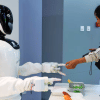Lab-grown sperm makes healthy offspring

Sperm have been made in the laboratory and used to father healthy baby mice in a pioneering move that could lead to infertility treatments.
The Chinese research took a stem cell, converted it into primitive sperm and fertilised an egg to produce healthy pups.
The study, in the Journal Cell Stem Cell, showed they were all healthy and grew up to have offspring of their own.
Experts said it was a step towards human therapies.
It could ultimately help boys whose fertility is damaged by cancer treatment, infections such as mumps or those with defects that leave them unable to produce sperm.
Sperm factory
Making sperm in the testes is one of the longest and most complicated processes in the body - taking more than a month from start to finish in most mammals.
Now scientists have been able to reproduce the feat in the lab.
An embryonic stem cell, which can morph into any other type of tissue, was guided towards becoming sperm with a cocktail of chemicals, hormones and testicular tissue.
In order to develop properly the cell must go through a crucial and delicate rearrangement of its DNA - its code of life - called meiosis.
Just like a female's egg, sperm must lose half of their chromosomes (bundles of DNA) so that a fertilised egg has a normal amount.
The Chinese research team say they have met the international gold-standard set out for reproducing meiosis in the lab.
But they did not create sperm as you would recognise them with a head and a tail for swimming - they were a stage earlier known as spermatids.
However, the spermatids have the correct amount of genetic information and were successfully inserted into mouse eggs through IVF.
"All the offspring were healthy and fertile," Professor Xiao-Yang Zhao, from the Chinese Academy of Sciences, told the BBC News website.
He told the BBC that he hoped the study would offer "inspiration" for similar work with human tissue to "solve the problem of sterility".
However, he said there were "ethical concerns" and "possible risks should be ruled out first".
His colleague Professor Jiahao Sha, from Nanjing Medical University, said: "We think that it holds tremendous promise for treating male infertility."
Spermatids have been used to create healthy human babies in Japan. But the procedure is illegal in some countries.
Another challenge the field needs to overcome is the starting material - no adult has embryonic stem cells.
The Chinese group believe converting skin cells into a stem-cell state, which can be done reliably, will be the solution.
Exciting
Professor Robin Lovell-Badge, from the UK's Francis Crick Institute, praised "an impressive amount of work" and "exciting" results which will be "fantastically useful for basic research".
He said: "I expect many think it is easy to make sperm, most men just sit there and make millions of the little blighters every hour. However, as this paper clearly shows, it is much more complex than this."
While Professor Allan Pacey, from the University of Sheffield, argued making sperm outside the body "would be a remarkable thing to be able to do, both for the advancement of science and also to be able to help infertile men".
He added: "In spite of these encouraging results, we are still some way from immediately applying this technique as a potential cure for human male infertility."

 For all latest news, follow The Daily Star's Google News channel.
For all latest news, follow The Daily Star's Google News channel. 








Comments